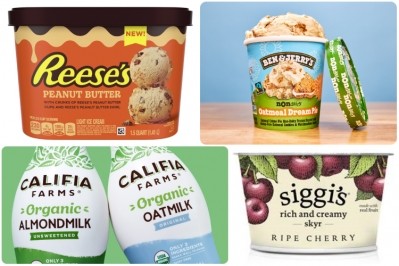'I don’t think there’ll be a future for cows at some point': Ice-cream makers ponder the fate of the category

Hosted by Food Ingredients Europe, the panel, comprised Niclas Luthman of sugar-free ice cream brand N!ck’s; Damien Kennedy of no-sugar ice cream firm Wheyhey, and Harry Thuillier, co-founder of low-calorie ice cream company, Oppo Brothers.
While all three brands position themselves in the better-for-you segment, their founders were in agreement that ice cream remains ‘first and foremost an indulgence’ – and marketing it as anything but hides pitfalls.
“Consumers don’t want to see too many ingredients that they don’t recognize,” Thuillier said. “In the past, we’ve tried to put lots of different superfoods, but if you put that in the front-of-pack, it can be confusing for consumers."
Luthman added: “You don’t eat ice cream because you’re going to get stronger, you eat it because you want to enjoy the moment. What people are asking for are the classic cookies and cream, chocolate brownie flavors. Let’s make [these] as healthy as we can.”
Kennedy, whose firm started out marketing high-protein ice cream for the health-conscious consumer, chimed in: “When we launched, our plan was that we wanted to get 20 grams of whey protein isolate in 100g pots and sell it to every gym guru in the country. The reality is, people don’t want ice cream after going to the gym, which was a very early learning lesson for us. Since then, we’ve changed our messaging and focused on sugar-free.”
From exotic flavors to firm favorites
In a similar vein, exotic flavors – despite being on-trend according to market research – don't always entice mainstream consumers. “As a manufacturer, you have to fight two wars – one is to have a good product, the other one is for people to want to grab it from the shelf," Luthman said. "We had a chilli mango flavor this summer, but people weren’t really convinced.
“So the only things you could go a little bananas with are seasonal flavors - we have a pumpkin swirl now in Walmart. That’s about as adventurous as it gets, unfortunately.”
Thuillier agreed that manufacturers need to keep a fine balance between novelty and familiarity. “You’ve got to decide how you want to be different with your brand, and what should stay the same,” he said. “We do a lot of benchmarking to make sure that consumers can’t tell the difference between us and Häagen-Dazs – we don’t like to launch a product unless it has parity.”
Kennedy echoed this: “Consumers aren’t as adventurous as we’d like to think they are. They have their firm favourites. We can’t afford to spend a lot of money on a flavor that doesn’t move off the shelf.”
Regional specificities are also at play here, as Luthman explained: “When you get tired of cookies and cream, you may want something with cardamom. Except Americans don’t like cardamom, and it’s the same with hazelnut, even if they do like Nutella. So I can make hazelnut ice cream for myself, but I can’t sell it in the US.”
The vegan trade-off
According to Allied Market Research, the vegan ice cream category is set to grow at a CAGR of 13.7% to reach $805.3m by 2027. But the three ice-cream company founders pointed out that barriers to an even wider commercialization remain, including around R&D and marketing. “This market has taken a lot longer to move than we were expecting,” observed Thuillier, adding that vegan ice cream just ‘doesn’t sell so well’. “It’s hard to keep the listings when you know that you could get so many more sales with a cookies and cream dairy version. It’s a hard balance to make a commercial decision.”
Delving into N!ck’s R&D process, Luthman explained his experience of incorporating vegan ingredients in ice cream. “All the proteins are supposed to be flavourless, neutral, or slightly nutty, yet we’ve never found any vegan ones that we can make ice cream with unless they were very, very expensive,” he said, adding that continued innovation is key to getting the right results.
Sustainability: big players must lead the way
All three company founders agreed that whilst there were certain mitigating measures they could all take to improve sustainability, in practice, big market changes are dictated by big players. Kennedy said: “If I went to our packaging partner and told him that I want x, y, z, I’d be laughed out of the room. Unilever, Nestlé, General Mills will be able to dictate that change in packaging over time; business like ours won’t.
“Of course, consumers are engaged…and they want to know that you’re…making a change but the consumer too needs to be slapped in the face with the reality of climate change before it’s going to happen.”
He added that addressing sustainability as an industry was key to success. “Farming and dairy farming and crop farming have to be part of the solution. For a period, dairy farmers had been demonized, [people would say] ‘this is not the solution, this needs to be lab-grown’. That is not going to happen any time soon. We need farmers to be endorsed and supported to be part of a solution moving forward.”
Thuillier chimed in: “I don’t think there’ll be a future for cows - at some point. It’s not going to be 10 years’ time - it might be 30 or 40 years’ time, and we’ve got to work with what we have and continue to drive really good quality non-dairy flavors.” He added that converting consumers to this new type of food manufacture is a 'marketing issue' for the industry.
For Luthman, precision fermentation and cultivated dairy offer ‘exciting’ opportunities, but sales of his own products that leveraged precision fermentation proteins had been 'disappointing'. “I don’t know how long I spent making our animal-free line with Perfect Day’s protein. [It was] so much work! Now it’s on the market, and I think it’s just one percent of our revenue.”
Offering his view on when this market could take off on a larger commercial scale, he said it won't be until 'climate change is really shaking us'. "I don’t think there’ll be any change before the train is off the rails," he concluded.
The value of 'healthy'
Finally, it remains a key objective for manufacturers to educate the consumer – be it about the hurdles to sustainability facing manufacturers, or the real value of the term ‘healthy’.
Wheyhey's Kennedy concluded: “A lot of education needs to take place to educate the consumer that low-calorie doesn’t mean healthy; low-fat or low-sugar doesn’t necessarily mean healthy – it needs to be the combined product.”












